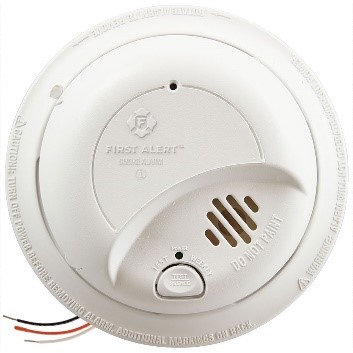1. Have you read your manufacturer’s instructions to identify what the alarm sound means? Try to identify what the alarm is telling you.
2. If you suspect that you have CO in your home, please leave the home immediately and move to a fresh air location outdoors. Make sure everyone is accounted for.
3. Call 911 or your local gas company.
4. Do not reenter the house until it is safe to do so and emergency responders have given you permission.
The Meridian Fire Department would like to emphasize the critical nature of having properly installed and functioning smoke detectors. Smoke alarms provide precious time to escape and can be the difference between life and death.
If your smoke alarm is going off, please call 911.
If your smoke alarm is chirping, we recommend asking a family member, friend, neighbor or a local handyman service for assistance.
The National Fire Protection Association offers several smoke alarm safety tips, including:
- Install smoke alarms in every sleeping room and outside each separate sleeping area.
- Install alarms on every level of the home and consider extra alarms for larger homes.
- Smoke alarms should be interconnected, so when one sounds, they all sound.
- Test all smoke alarms at least once a month and replace batteries as necessary.
- Keep smoke alarms at least 10 feet (3 meters) away from the stove to reduce false alarms.
- Consider using special alarms with strobe lights and bed shakers for those who are hearing impaired or deaf.
- Replace all smoke alarms every ten years.
New smoke alarms on the market employ different types of technology, including multi-sensing, which can detect smoke and carbon monoxide.
In the event of a smoke alarm sounding, evacuate the building immediately and stay outside.
It is important to recognize the different sounds your alarms make, either alerting you of danger or simply needing the batteries changed. For more information on these sounds, you can watch the informational video on this page “Learn the Sounds of Safety” or refer to your alarm manufacturers guide.
For more information on proper smoke alarm installation and other safety tips, please visit www.nfpa.org/smokealarms.
Smoke Alarm Program
Smoke alarms are a critical line of defense in protecting your home and loved ones from the dangers of fire. They provide early warning and detection in case of smoke or fire, giving you precious extra minutes to escape safely.
Our Smoke Alarm Assistance Program is dedicated to ensuring that elderly, disabled, and low-income individuals have access to essential smoke safety tools. Please note, smoke alarm service calls are offered one day a week and being scheduled 4 weeks out.
Carbon Monoxide FAQ


